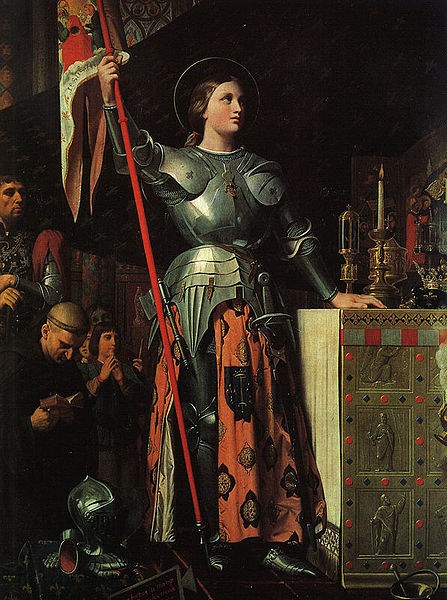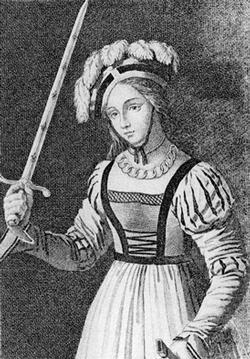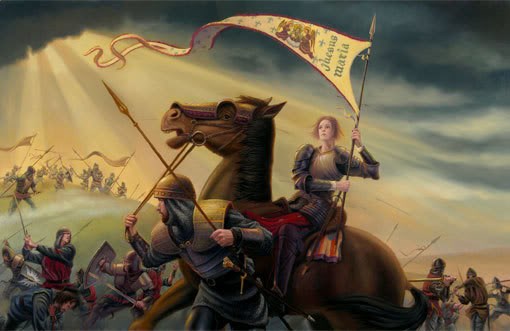 |
| (blog.adw.org/wp-content/uploads/2009/04/joan-...) |
"The hero is one who kindles a great light in the world, who sets up blazing torches in the dark streets of life for men to see by" (Felix Adler). It takes a great person to impact the world enough to leaving a forever shining light. One woman who left this kind of light was Joan of Arc, a lady who went above and beyond the call of duty and went on to accomplish extraordinary things. Joan of Arc can be considered a hero because in her short but meaningful time in this world, she made a daring and valiant stand; she sacrificed the most precious gift — her own life — and inspired a nation.
Around 1412, Joan started her life in the little village of Domrémy, France. Born into an impoverished Catholic family, Joan spent the first seventeen years of her life like any other girl of her status. She never learned to read or write, but she excelled at sewing and spinning. At the age of thirteen, Joan alleged that she received messages and visions of past saints who informed her of a very important mission. The saints instructed Joan to lead a king’s army and to restore her country to a state of peace and greatness. So, at seventeen, Joan set out to do just that. She emerged victorious on her journey until the Burgundians, England’s allies, captured her at a small battle. They handed her over to the English, and thus began the famous trial, which would be solidified in history forever.
 |
| (www.nndb.com/.../635/000055470/joan-of-arc.jpeg) |
Despite her young age, Joan of Arc demonstrated so much bravery and courageousness. She came from humble beginnings, but achieved great things. She is described as “a simple peasant girl who rescued France from defeat in one of the darkest periods of the Hundred Years' War with England” (Schmalz). It took more than mere bravery for Joan to travel to King Charles and inform him that mysterious visions had presented her the duty of saving France from the English. Women were not allowed in battle, and even though the king accepted Joan into his army, she still had to gain acceptance by her countrymen. They were uneasy about the king’s decision, and the “French commanders hesitated to obey her. However, they soon realized that all went well when they followed her orders” (Schmalz). By winning battle after battle, Joan showed not only that she could be courageous, but she was capable of doing the impossible. At first, no one believed that Joan could steer the French to victory, but she proved them otherwise. The first turning point for Joan happened when she rescued the city of Orléans, France, which the English completely controlled. Since she successfully liberated the city, Joan is often referenced to as the Maid of Orléans. Amazingly, “Joan's forces broke the siege of Orléans in only 10 days, and the English fled” (Schmalz). The city, finally emancipated, had Joan to thank. If she never led King Charles VII’s army, then perhaps Orléans wouldn’t be the successful place it is today. History paints Joan as a magnificent woman, and her gallantry creates this portrait.
Joan of Arc always seemed to overcome her challenges and any adversity that obstructed her path, but her final obstacle managed to take her life. When Joan was captured by the Burgundians and sold to the English, the Church of England framed her visions as malevolent and ungodly. Joan’s trial, which lasted a little over a month, was grueling. Charged with heresy, Joan “could not have counsel or call witnesses. As a layperson she had no religious order to speak for her, nor had she ever enlisted the support of a priest” (Barstow). Joan had no one to stand up for her. She faced a panel of enemies, and “the judges insisted that she submit to the church's interpretation that her visions were evil, but Joan held to her claim that they came from God. Perhaps without intending it, Joan thus advocated the right of individual experience over the church's authority” ("Joan of Arc." Encyclopedia of Religion). Joan refused to give in to the church’s accusations about her visions, but she renounced her faith before she died. She challenged the church’s authority, which was unheard of at the time and it was inconceivable for a woman to stand up against the church. Centuries later, the Catholic church finally recognized how much she had sacrificed by not submitting to the Church of England. “Joan's belated canonization in 1920 by Pope Benedict XV helped to guarantee her immortality” ("Joan of Arc Liberates Orléans, April 28, 1429-May 3, 1429"). Joan gave up her life to benefit others. She will live on forever because she stayed unwavering on her path.
 |
| (msp93.photobucket.com/.../joan_arc_good.jpg) |
Joan of Arc was not just an inspiration to the French; she is an inspiration to people around the world. Not too much is known about her personality, but she definitely possessed determination and fortitude. It is said that, “Joan twice went to Robert de Baudricourt, the captain of Vaucouleurs, asking for armor, a horse, and an escort to Charles VII at Chinon, but her request was denied both times. However, Joan was both persistent and persuasive, and when she went to de Baudricourt a third time he granted her request” ("Joan of Arc." UXL Encyclopedia of World Biography). In that kind of situation, Joan shone. Her strength of mind is what inspired the French to fight for her and let her guide them. Her story is so remarkable that “her trial and her execution have inspired numerous books, dramas, and poems by authors as diverse as Christine de Pisan and George Bernard Shaw; artists through the centuries have portrayed her as a warrior saint dressed in armor, carrying the banner of God and the standard of France”( Joan of Arc (c. 1412–1431)." Dictionary of Women Worldwide: 25,000 Women Through the Ages). Her light shone through a dark period of time, and it still shines today. Mark Twain wrote in his biography of Joan that, “‘She was truthful when lying was the common speech of man; she was honest when honesty was become a lost virtue;… she was of a dauntless courage when hope and courage had perished in the hearts of her nation.’” ("Heroes and Leaders"). Joan showed integrity and bravery when nobody else did, and that makes a true hero. She reminds us that sometimes we must do something nobody else will ever dare to attempt.
The life of Joan of Arc represents bravery, dignity, and the true meaning of heroism. Joan of Arc teaches us that sometimes we must take risks and go against the current, no matter how strong the pull. We all must stand at a fork in the road one day, poised between two paths that hold two very different decisions and outcomes. And when that time comes, we all must choose the right path instead of the easier one.
Page created on 5/20/2010 12:00:00 AM
Last edited 5/20/2010 12:00:00 AM
"Heroes and Leaders." Literary Themes for Students: War and Peace. Ed. Anne Marie Hacht. Vol. 2. Detroit: Gale, 2006. 580-586. Gale Virtual Reference Library. Web. 3 May 2010.
Joan of Arc (c. 1412–1431)." Dictionary of Women Worldwide: 25,000 Women Through the Ages. Ed. Anne Commire and Deborah Klezmer. Vol. 1. Detroit: Yorkin Publications, 2007. 968-969. Gale Virtual Reference Library. Web. 3 May 2010.
"Joan of Arc (c. 1412-1431)." DISCovering Biography. Online ed. Detroit: Gale, 2003. Student Resource Center - Gold. Gale. DEL NORTE HIGH SCHOOL. 27 Apr. 2010
Joan of Arc." Encyclopedia of Religion. Ed. Lindsay Jones. 2nd ed. Vol. 7. Detroit: Macmillan Reference USA, 2005. 4929-4930. Gale Virtual Reference Library. Web. 28 Apr. 2010.
"Joan of Arc Liberates Orléans, April 28, 1429-May 3, 1429." DISCovering World History. Online ed. Detroit: Gale, 2003. Student Resource Center - Gold. Gale. DEL NORTE HIGH SCHOOL. 3 May. 2010
Joan of Arc." UXL Encyclopedia of World Biography. Ed. Laura B. Tyle. Vol. 6. Detroit: UXL, 2003. 1005-1007. Gale Virtual Reference Library. Web. 1 May 2010.
Schmalz, Mathew N. "Joan of Arc, Saint." World Book Advanced. World Book, 2010. Web. 28 April 2010
